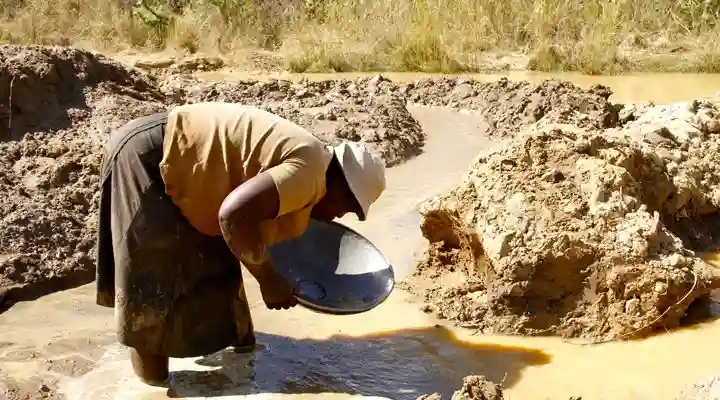The government of Zimbabwe has imposed an immediate ban on riverbed mining or alluvial mining due to its detrimental effects on the environment.
During a media briefing following the Cabinet meeting in Harare on Tuesday, Information, Publicity, and Broadcasting Services Minister Jenfan Muswere said alluvial mining has significantly contributed to water pollution, siltation, and the degradation of river channels, disrupting vital riverine ecosystems. He said:
Cabinet considered and approved the Report on Alluvial Mining and Rehabilitation of Degraded Rivers, which was presented by the Minister of Lands, Agriculture, Fisheries, Water and Rural Development, Honourable Dr Anxious Masuka, as Chairperson of the Inter-Ministerial Committee on Mining and Environment.
Cabinet noted that, ever since its commencement in 2011 across the country’s rural provinces, large-scale and mechanical alluvial mining or riverbed mining has resulted in water pollution, siltation, and degradation of river channels and disruption of riverine ecosystems. Cabinet directed that riverbed mining be banned with immediate effect.
Lands, Agriculture, Fisheries, Water, and Rural Development Minister Anxious Masuka highlighted that some individuals are engaging in illegal riverbed mining without proper registration.
He also noted that many who do register with the relevant authorities fail to comply with legal regulations during their mining activities. Said Masuka:
We have noted three classes of mining companies those that apply legally and adhere then those that apply but do something different, and then there are the illegal ones who just go to the river.
In banning we need to ensure that courts mete out deterrent penalties and fines; we felt that the fines are not deterrent enough and the experience is that some of the companies saw it is better to pay a fine than rehabilitate. It was felt that this was tantamount to environmental theft.
Alluvial mining involves extracting valuable minerals and resources from riverbeds, floodplains, and other sedimentary deposits. The term “alluvial” describes materials deposited by water, including sand, gravel, and clay.
In Zimbabwe, this practice is prevalent in gold-mining regions and has led to severe environmental consequences, including the “death” of rivers, water pollution that affects both livestock and aquatic life, and increased siltation in rivers and dams.
More: Pindula News

